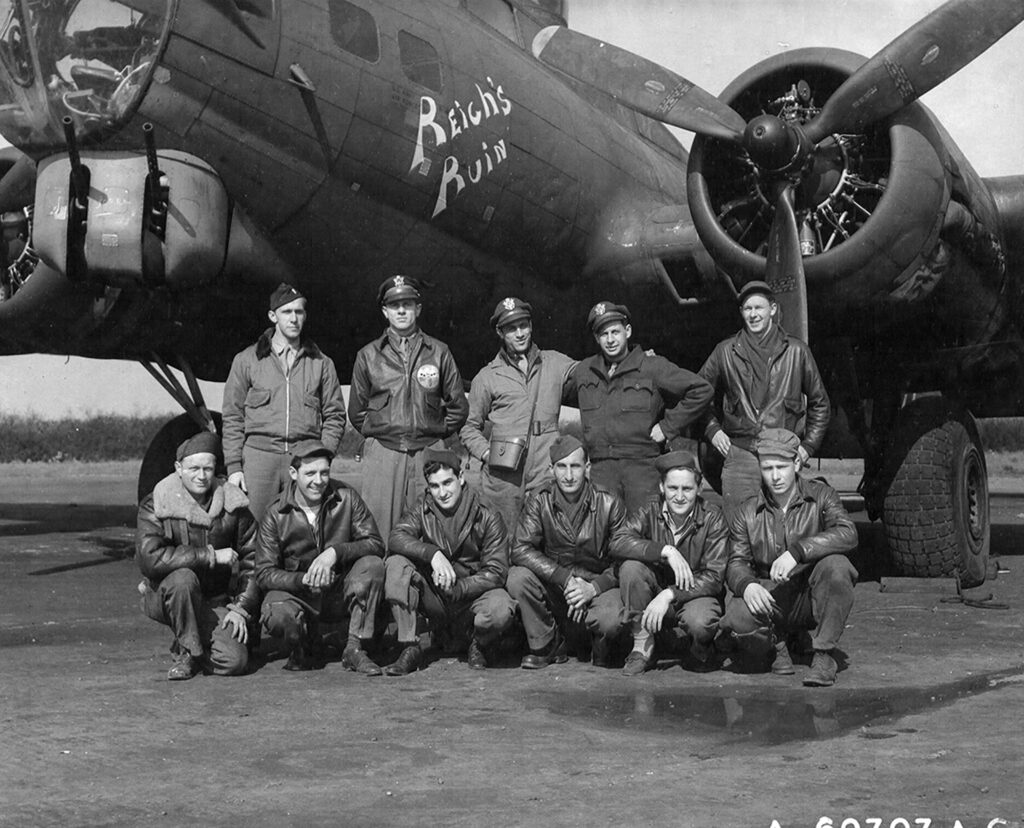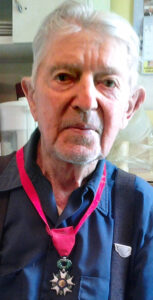A House Full Of
Heroes Survived

on destroying the feared German V2 rockets.
By TERRY BERKSON • Special to www.AllOTSEGO.com

action he and his four brothers saw during World War II. All returned alive. He was awarded French Medal of Honor.
RICHFIELD SPRINGS – At a Vets’ Club dinner several years ago, Jim Andrecheck, who lives in South Columbia just outside of Richfield Springs, began to tell stories about his combat experiences during World War II.
What was amazing to hear was that he had four more brothers who had comparable harrowing experiences – and they all lived to tell about them.
• ► THOMAS, AIRPLANE MECHANIC IN U.K.
His oldest brother Thomas enlisted before the war started but wound up spending three years in bomb-ravaged England working as an airplane mechanic. “Tom was kind of a daredevil on a motorcycle,” Jim says.
He achieved the rank of master sergeant and was honorably discharged after the war. Thomas retired to Florida, where he died in 1994. He was buried in Arlington National Cemetery.
►JOSEPH, IN OPERATION APHRODITE
The second oldest brother, Joseph, enlisted and was assigned to the Eighth Air Force. He became a pilot on a B-17 and was stationed in England during the war. Before the war, Joseph liked to box and play baseball, Jim says.
After completing 35 missions, Joseph took part in Project Aphrodite that was manned by volunteers. The goal was to knock out the nearly indestructible launching sites for German V2 rockets that were considered a great threat to American security.
The plan was to have the pilots bail out while another plane would then radio fly the fatigued but explosive-laden B-17 bombers directly into the target.
Joseph bailed out over the English Channel and shortly after he was picked up, the ship he was on fell under attack by German submarines.
Joseph Kennedy Jr. was one of the pilots killed during the Navy’s participation in this desperate mission. Joseph Andrecheck pursued a career in the military and after 22 years of service he was honorably discharged with the rank of lieutenant colonel and retired in Florida where he lived for the rest of his life.
► ROBERT, WITNESS TO NAGASAKI
Robert was the last brother to enter the military. He joined the Marine Corps in 1944.
When he tried to enlist in Utica, officials turned him down because four of his brothers were already overseas. So, Robert went to Albany and succeeded in signing up.
He served as a rifleman in the Pacific and participated in action on Okinawa. “At home we called him Beaver because he used to do a lot of trapping,” Jim says.
Robert witnessed the aftermath of the bombing of Nagasaki while the city was still smoldering. He was honorably discharged in 1946 with the rank of corporal. He died in 1981 of cancer possibly due to his exposure at Nagasaki. He was laid to rest at St. Joseph’s cemetery in Richfield Springs.
► FRANK, WON 5 BATTLE STARS
Frank, the youngest of the brothers (I’m saving Jim for last) was drafted into the service in 1943 and reenlisted after his first tour of duty.
During the war he served for 28 months in the 554th Anti-Aircraft Battalion that was active in Africa, Italy, Corsica, France and Germany. “I remember in civilian life Frank had this contraption he used to improve his speech – for what reason I don’t remember,” Jim says scratching his head.
Frank was a cannoneer on a 40mm gun and was awarded five battle stars. He achieved the rank of staff sergeant and was honorably discharged in 1953 from the Army Air Corp. He retired and lived out his senior years in California.
ׇ►JIM, AT 99, HE BEARS WITNESS.
Last and least of the five brothers in stature was Jim. “They called me the runt,” he says.
He enlisted in the Army Air Corps in 1939 and was with the 25th Bomb Squadron in Panama when war was declared. He was sent to Ecuador for a year and later to North Africa and then on to Italy.
He served as a flight engineer and a ball turret gunner on a B-24 bomber.
“The assistant flight engineer was supposed to man the ball turret gun, but I fit in there better – so we switched,” Jim says with a chuckle. “I was putting myself in the hot seat, but I didn’t mind.”
He flew 50 missions, incredibly with the same crew, missions described by the military as battles of great intensity where many men and air ships were lost.
Over Steyr, Austria, Jim’s crew had orders to bomb a ball-bearing factory. They were in a “Tail-End-Charlie” formation that consisted of seven planes.
“The German anti-aircraft fire was very heavy,” Jim says. “And their fighters and JU-88 bombers were on us.”
In a short time, six of the seven American air ships were knocked down. One engine on Jim’s plane was failing and had to be feathered and the fuselage was riddled with holes.
The tail-end gunner was saved from flak by his parachute and the navigator, in his flak suit, was hit by a shell that didn’t explode. “The skipper ordered us to bail out but none of us liked the idea of jumping into the unknown, so we stayed with the ship and tried for home.”
By that time the smoke from the demolished factory was rising higher than Jim’s B-24. The plane barely made it back to the base, landing on one nose wheel and one big wheel. The other was blown out.
Later, Jim counted 365 holes in the plane. His crew was later recommended for the Distinguished Flying Cross but somehow the paperwork slipped through the cracks.
Jim is now 99 years old. Of the war he says, “I’m thankful that I got through it – that all my brothers got through it without a scratch. It was the greatest adventure of my life, though at the time I didn’t know it.”
Nine years ago Jim traveled to West Point where he and 50 other men received the French Medal of Honor for participating in the bombing of German occupied France in preparation for the landing at Normandy.
Jim Andrecheck has made some inquiries as to why he and his fellow crew members never got the Distinguished Flying Cross, for which they were recommended.
Now, he just hopes that one day a letter from Uncle Sam will arrive and instead of beginning with “Greetings!” It might start with, “We forgot something. . .”
“If I ever get that medal,” says Andrecheck, I’ll probably put it in a drawer—but it’ll be good to know that it’s there.” What Jim can’t put in a drawer is the aura of hero that he and his brothers carry with them.
Jim achieved the rank of master sergeant and was honorably discharged in 1945.
He is now retired and lives with his polka partner and wife Mary who he likes to say “makes the best cherry pies in the world.”


Just a brief comment from one, a schoolboy in WW2, what a record of this “band of brothers” a cross section of so many. B17 “Reich`s Ruin” I see listed as serial 42-31480 of 365 Sqdn. 305 B.Gp. who were at Chelveston. Operation “Aphrodite” flew from “Fersfield” as satelite to “Knettishall” 388th B.Gp. whose 360 Sqdn was responsible. They flew lightened war weary B17 & B24`s in a very risky attempt and would have marvelled at the accuracy now possible nearly 80 years on.